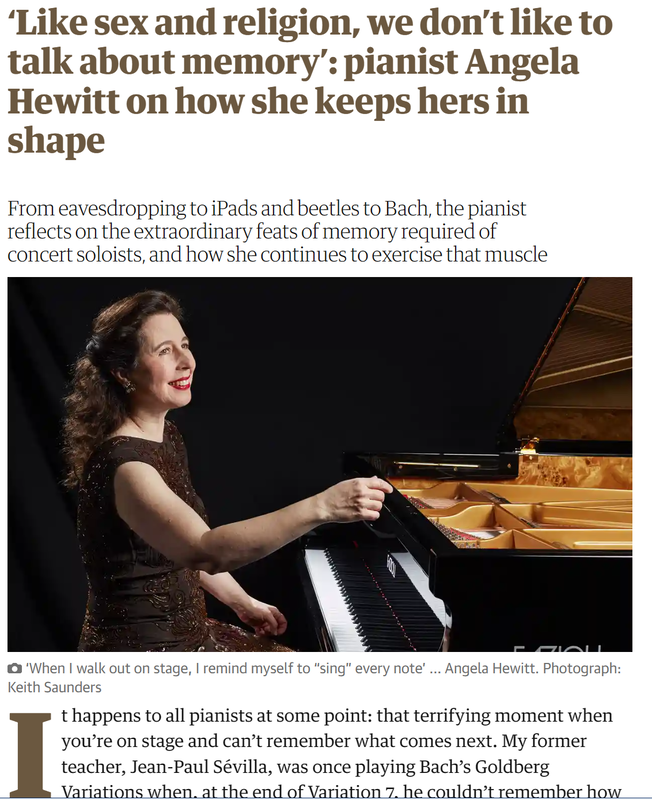|
Angela Hewitt shares her tactics, strategies, and stories on how she keeps her musical memory strong. It is interesting to note that musical conservatories, like the Royal Conservatory of Music in Toronto, have developed curriculums that prepare the ground for developing and maintaining musical memory.
Link to the article: ‘Like sex and religion, we don’t like to talk about memory’: pianist Angela Hewitt on how she keeps hers in shape | Classical music | The Guardian
0 Comments
A student writes, “Hey David, I wanted to check my learning strategy with you. My goal right now is to play better at the jams I attend. Most of them are funky with someone creating a groove, and everyone jumping in. I noticed the keys players are all very good at hearing the bass and figuring out the progression— or finding a groove within a set progression. At my level, I’m usually asking others what key we’re in (although it doesn’t always work since it changes) and then playing the root chord and inversions of it. I’ll sometimes create groove lines from the respective blues scale, but that’s about it for my understanding. Taken together, I’m thinking the number one thing I need to work on is: Ear training. For that, I’m thinking I focus on training my ear to understand:
Thanks! My response. Yes, this is a good start. Here are some more ideas to consider.
David One Chord Songs
The internet is full of folks who promise to show you a secret that unlocks an area of human knowledge or accomplishment that somehow all the "experts" have missed. From promises of miraculous weight loss, finding a mate, playing an instrument, to learning a new language, these carnival hucksters promise the same thing: a shortcut, a hack, a secret the experts refuse to reveal. which they are magnanimously stepping forward to reveal. The promise is that by consuming their product you can have results without effort or responsibility.
My wife, a professor of Education, told me today. "You can't consume knowledge. That's not how it works." Here is Plato's critique. "Picture a shipmaster in height and strength surpassing all others on the ship, but who is slightly deaf and of similarly impaired vision, and whose knowledge of navigation is on a par with his sight and hearing. Conceive the sailors to be wrangling with one another for control of the helm, each claiming that it is his right to steer though he has never learned the art and cannot point out his teacher or any time when he studied it. And what is more, they affirm that it cannot be taught at all, but they are ready to make mincemeat of anyone who says that it can be taught, and meanwhile they are always clustered about the shipmaster importuning him and sticking at nothing to induce him to turn over the helm to them. And sometimes, if they fail and others get his ear, they put the others to death or cast them out from the ship, and then, after binding and stupefying the worthy shipmaster with mandragora or intoxication or otherwise, they take command of the ship, consume its stores and, drinking and feasting, make such a voyage of it as is to be expected from such, and as if that were not enough, they praise and celebrate as a navigator, a pilot, a master of shipcraft, the man who is most cunning to lend a hand in persuading or constraining the shipmaster to let them rule, while the man who lacks this craft they censure as useless. They have no suspicions that the true pilot must give his attention to the time of the year, the seasons, the sky, the winds, the stars, and all that pertains to his art if he is to be a true ruler of a ship, and that he does not believe that there is any art or science of seizing the helm with or without the consent of others, or any possibility of mastering this alleged art and the practice of it at the same time with the science of navigation. With such goings-on aboard ship do you not think that the real pilot would in very deed be called a star-gazer, an idle babbler, a useless fellow, by the sailors in ships managed after this fashion?” Plato, The Republic Book 6 My promise? Learning to play the piano is doable with the right attitude, access to time and resources, a realistic attitude, and some intellectual humility. Though it won't be quick, it can be fun. David |
You've got to learn your instrument. Then, you practice, practice, practice. And then, when you finally get up there on the bandstand, forget all that and just wail. AuthorI'm a professional pianist and music educator in West Toronto Ontario. I'm also a devoted percussionist and drum teacher. Categories
All
|


 RSS Feed
RSS Feed